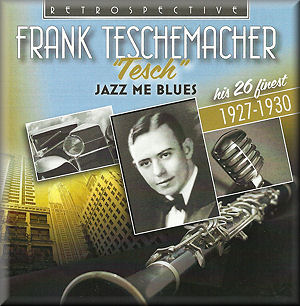1 Jazz Me Blues
Mckenzie & Condon's Chicagoans:
2 Sugar
3 China Boy
4 Nobody's Sweetheart
5 Liza
The Chicago Rhythm Kings:
6 There'll Be Some Changes Made
7 I've Found A New Baby
8 Baby, Won't You Please Come Home?
9 Friars' Point Shuffle
10 The Darktown Strutters' Ball
Charles Pierce & His Orchestra:
11 Bullfrog Blues
12 I Wish I Could Shimmy Like My Sister Kate
13 Nobody's Sweetheart
Miff Mole & His Molers:
14 One Step To Heaven (Windy City Stomp)
15 Shim-Me-Sha-Wabble
Eddie Condon & His Quartet:
16 Oh, Baby!
17 Indiana
The Dorsey Brothers & Their Orchestra:
18 'Round Evening
The Big Aces:
19 Cherry
Wingy Manone & His Club Royale Orchestra:
20 Trying To Stop My Crying
21 Isn't There A Little Love?
Ted Lewis & His Band:
22 Wabash Blues
Elmer Schoebel & His Friars Society Orchestra:
23 Copenhagen
24 Prince Of Wails
The Cellar Boys:
25 Barrelhouse Stomp
26 Wailing Blues
Frank Teschemacher & His Chicagoans
Frank Teschemacher (1906-1932) was a grievous casualty, an astonishing
individualist, and a cranky stylist, who died in a car crash before
he was 26. His hero was Bix Beiderbecke, who had only recently predeceased
the Kansas City native, and Tesch's principal beneficiary, in one
sense, was the equally ruggedly individualistic Pee Wee Russell, though
his influence on Benny Goodman is also strong and acknowledged.
Obviously, there's a `catch him while you can' quality to his recorded
life. It starts in this Retrospective single disc back in 1928 with
the track that gives the album its title, Jazz Me Blues,
and gives us a template for white Chicago jazz, albeit with a two
man front line of alto and clarinet, which was a clear reference to
what Jimmy Noone and Doc Poston were doing on the (black) South Side
of the city. I should add that Mezz Mezzrow was also on clarinet,
but fortunately we don't hear much of him. It's actually quite a hesitant
number and I don't rate it highly, even if the alto was the fine Rod
Cless.
There then follow four total classics, recorded the previous year,
and played by McKenzie and Condon's Chicagoans, that all lovers of
such things will know by heart. How amazing for me to remember that
one of the musicians in that band, Jimmy McPartland, once put his
big paw on my shoulder at the 100 Club in London and said to me, kindly,
as he passed; `Scuse me, son'. He then sat on the chair Bix had used
back in Whiteman days and blew the place down.
One should always note the sheer angularity of Tesch's playing,
its Cubist lines to the fore, and the hot company he kept - all the
very best of his confreres, which meant Muggsy Spanier, Joe Sullivan,
Eddie Condon, Red Nichols and Gene Krupa and all the gang. There's
a modern sounding riff on Bullfrog Blues where Tesch's clarinet
edges towards Johnny Dodds, himself active in the city at the time.
Not everything works, despite the tight company. The Dorsey Brothers
band and The Big Aces are both disappointing, the latter especially
as it included Jack Teagarden and Don Redman, but the results are
souped up dance band music. Ted Lewis's ghastly Wabash Blues
is still puke-making. Also Dick Feige was no Spanier and not all the
Charles Pierce tracks are especially good. Indeed Miff Mole's band
rather sweeps them away, both musically and in terms of recording
quality - hardly a fair comparison, of course, as Mole was an elite
player and his companions included Nichols, Sullivan, Condon and Krupa.
And more kudos comes via The Cellar Boys, where Wingy Manone blows
a superb cornet, Charles Melrose plays a mean accordion, and tenor
player Bud Freeman proves that he was ahead of the game back in 1930.
So, some rather up and down sessions here. But that's what happens
when your recording career lasts barely two and a bit years. Inevitably
there will be dullish or eccentric sessions to be balanced by some
of the hottest, most driving Chicagoan jazz this side of Heaven.
Transfers are good. The personnel listings are generally accurate
but I noted a few misattributions and mistakes.
Jonathan Woolf
See also review by Tony
Augarde
